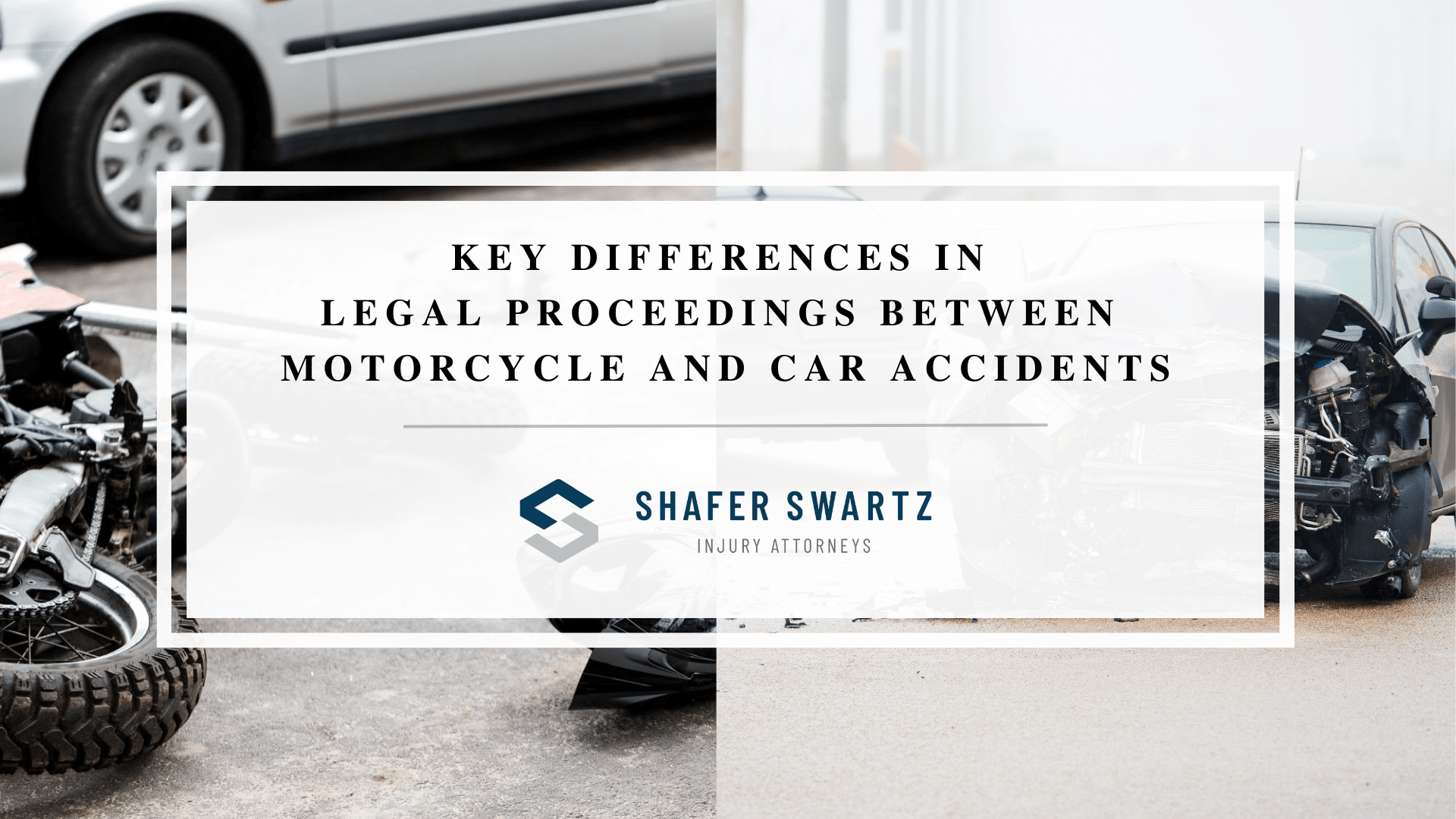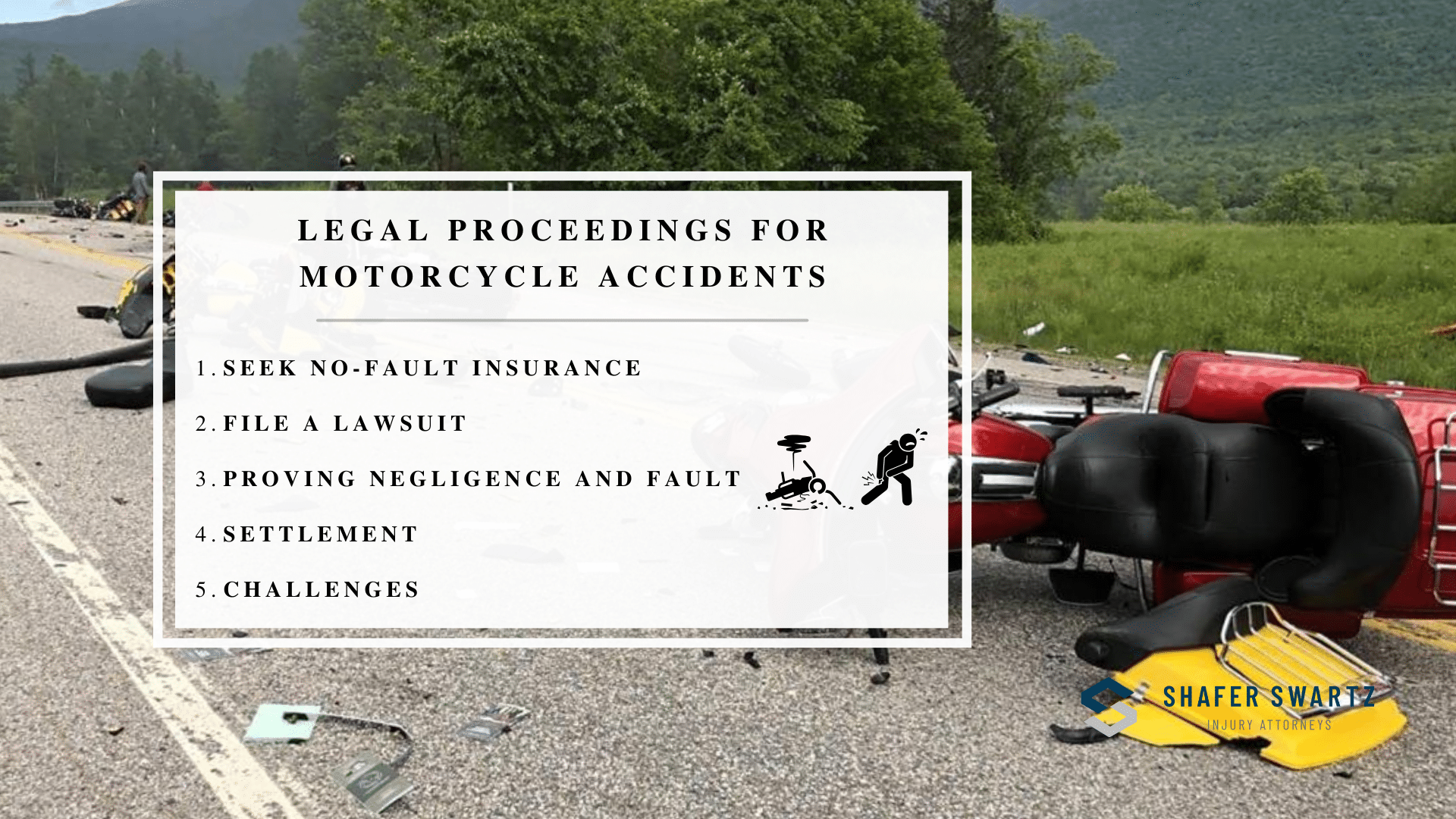The key differences between motorcycle and car accident legal proceedings in Michigan include complex liability issues, proving negligence, possible juror bias, insurance coverage, and more. Understanding these issues is critical because they affect your legal rights and options. If you are involved in an accident, you will need to be able to prove your case and seek a fair settlement or favorable verdict.
In 2021, motorcycles accounted for 14% of traffic fatalities and 17% of occupant fatalities, despite making up only 3% of registered vehicles. In Michigan, motorcycle fatalities (166) account for 14% of traffic fatalities (1,131) in 2021. Due to these numbers, motorcycle accident lawsuits are more challenging to win than other personal injury cases. They frequently result in more severe injuries for the motorcyclist and are more likely to be the result of driver negligence.
Motorcycle vs. Car Accidents Overview
Motorcycles and cars are two very different types of vehicles, and their accidents are also different in nature. Here’s a detailed explanation below:
Motorcycle Accidents
Motorcyclists are more at risk of injury and death than other road users. Studies show that per vehicle mile traveled, motorcycle riders have a 34-fold higher risk of death in a crash than other drivers. Their vulnerability and increased risk of injuries and fatalities can be attributed to several factors, such as:
Size and Stability. Because motorcycles are smaller and less visible than cars, they can easily be hit and overlooked on the road. They are also less stable and can easily be tipped over in a collision.
Road and Weather Conditions. Motorcyclists are more affected by road and weather conditions than drivers of other vehicles. Potholes, gravel, wet pavement, and wind gusts can cause them to skid, slide, or lose control. And, because motorcycles lack the same protection as cars, weather can also easily affect their visibility, making them more prone to collisions.
Reckless and Aggressive Behaviors. Motorcyclists frequently ride more aggressively than car drivers, resulting in risky behaviors such as speeding, weaving in and out of traffic, and not wearing a helmet. According to data, speeding is responsible for 34% of all fatal motorcycle accidents.
Driver Alertness and Awareness. Inattentiveness and impaired alertness can result in slow reaction time, lack of proper judgment, poor vision, and others. Several factors influence motorcyclists’ alertness on the road, making them more vulnerable to accidents. Studies show that these are:
-
-
-
- Fatigue
- Use of mobile phones while riding
- Drowsiness
- Inattentiveness
-
-
Furthermore, other drivers often make mistakes when sharing the road with motorcycles, leading to serious accidents.
Less Protection. Motorcycles offer less protection than cars in the event of an accident. As a result, motorcyclists are more vulnerable to severe injuries and fatalities.
Car Accidents
The size of the vehicles involved dramatically influences the impact forces and severity of damage and injuries in car accidents. Generally, larger vehicles are safer than smaller ones because they have more crumple zones, stronger frames, and airbags. The crumple zone is the area that absorbs the force of impact in a collision.
In 2021, passenger car, SUV, and van accidents accounted for most traffic crashes in Michigan. Furthermore, 20.6% of fatal crashes are caused by drivers speeding.
Common Types of Vehicle Collisions
According to Michigan data, left-turn crashes are the most common type of motorcycle accident. Meanwhile, the most common car accident is a driver losing control and crashing, or a single-motor crash. Here are some other common vehicle accidents:
| Type | Description |
| Left-Turn Collisions |
|
| Head-On Collisions |
|
| Rear-End Collisions |
|
| Sideswipes or Side-Impact Collisions |
|
| Single-Motor Crashes |
|
| Lane-Splitting Collisions |
|
Legal Proceedings for Car Accidents
Car accidents are a common type of personal injury case, and they follow the same basic legal procedures and concepts as any other personal injury case.
1. Seek No-fault Insurance
Michigan’s no-fault insurance system means you can claim damages from your insurance company if you get into an accident, regardless of who was at fault. Car owners who get into an accident can file for Personal Injury Protection (PIP) for lifetime medical expenses up to the policy’s maximum coverage amount. Furthermore, PIP will also cover wage losses and replacement services for up to 3 years after the accident.
2. File a Lawsuit
There are at least three common types of lawsuits filed for personal injury cases in Michigan, such as in a car accident. The first is the negligence tort claim, the lawsuit you file against the negligent driver for causing the accident. Second, the pain and suffering lawsuit against the other party for your non-economic injuries. Finally, you can sue the at-fault driver for excess PIP medical benefits. Meanwhile, the two significant Michigan legal concepts in a personal injury case are:
Comparative Negligence Law. Under Michigan’s comparative law, damages may be reduced based on your level of fault in the accident. If you are more than 50% at fault, damage claims may be forfeited.
Serious Bodily Injury Threshold. To seek damages for serious impairment of body function, the injury must be:
-
-
-
- Objectively manifested, meaning it can be seen by someone other than the injured person
- An impairment of a body function that is important to the injured person
- Injury and impairment are permanent
-
-
An experienced Michigan personal injury attorney can explain the law and represent you in court or negotiations with the other driver’s insurance company.
Legal Proceedings for Motorcycle Accidents
A motorcycle accident lawsuit is also a type of personal injury lawsuit. However, it has unique features and challenges compared with car accidents, such as the following:
1. Seek No-Fault Insurance
Motorcycles are not motor vehicles under Michigan’s no-fault law, so they do not have unlimited Personal Injury Protection (PIP) for property damage, injury, or death.
2. File a Lawsuit
Motorcyclists can file the same lawsuits as in any personal injury case. However, motorcyclists tend to seek more damages than car drivers because they suffer more severe injuries and damages in accidents.
3. Proving Negligence and Fault
Because motorcycles are more prone to accidents, it can be challenging for motorcyclists to prove their case and establish fault. Motorcycle accident lawsuits may require different types and more substantial evidence to prove the other party is more liable for the accident.
Furthermore, the court will also determine if the motorcyclist followed the Michigan Motorcycle Law. For instance, if a motorcyclist was head-injured but did not wear a helmet, that is negligence. Thus, comparative negligence laws may lower compensation.
4. Settlement
Because it can be more difficult for motorcyclists to prove negligence against a car driver in an accident, many opt for a settlement instead.
5. Challenges
Insurance. Because motorcyclists are more likely to be injured in accidents and have less no-fault coverage, most insurance companies do not cover motorcycle accidents or offer lower settlements.
Juror Prejudice. Jurors often have a bias that motorcyclists are reckless. Hence, it needs more evidence and a skilled Muskegon personal injury lawyer to convince them otherwise.
Key Differences in Legal Proceedings
Here’s a glance at the key difference in the legal proceedings between motorcycle and car accidents:
| Motorcycle Accidents | Car Accidents | |
| No-Fault Insurance | Not entitled to unlimited PIP benefits | PIP benefits include lifetime medical expenses up to the policy’s maximum |
| Insurance Requirements | Motorcyclists need liability insurance but not a no-fault policy | Car drivers are required to purchase a no-fault insurance policy |
| Juror Perspective | Most jurors often have a perception that motorcyclists are reckless and negligent | Jurors will likely have no biases when parties establish negligence and fault |
| Establishing Negligence | Motorcyclists must need stronger evidence and proof that the other party was negligent, especially if there are juror biases involved | Comparative negligence can reasonably be applied |
| Damages and Claims | More damages and injury claims can be expected since motorcycles offer less protection | Car accidents result in lesser damage compared to motorcycle accidents |
Legal Assistance Is Necessary in Both Cases
Get legal help to protect your rights and get a fair result, whether you drive a car or a motorcycle. Motorcycle accidents can be hard to win without knowing Michigan laws. Thus, choose a competent Michigan personal injury attorney who specializes in motorcycle accidents. The same advice goes for car accident cases when you’re exploring legal options and pursuing fair compensation. We at Shafer Swartz PLC are with you as you face the challenges. We’ve had years of experience and successful cases, and we can help you get the justice you deserve. Reach us here or call (231) 722-2444 for an appointment.


